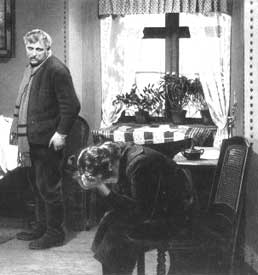Deliberately paced & moodily realistic, Scherben (Shattered, 1921) shows simple domestic life of a railroad worker (Werner Krauss, best known as Dr. Caligari), his wife (Hermine Strabmann-Witt), & his daughter (Edith Posca).
Set in an isolated mountain town, we see aundry hung, dinner served. Even in this normal environment, the moodiness becomes extreme, like an exterior shot through a dim window with branches scraping glass, or the telegraph lines against a gloomy sky, or the daughter gazing into a mop bucket for an inordinate length of time as though spying something remembered or unexpected therein.
A scarecrow in the garden wobbles in the wind like a ghostly thing, it's arm pointing at the window of the upstairs bedroom.
The telegraph tickertape tells that an inspector (Paul Otto) is on his way to the town, to investigate a disappearance. A wind seems to blow through the house.
The long wait for the inspector's arrival is tense & suspenseful. The revelation of a horrible crime perpetrated upon the household, & what the family did in response, ranges from tragedy to ferocity, all madly understated.
Though the sets aim at realism, in the atmospherics & emotions, this is as Expressionist as are visually bizarre German Expressionist films. Every scene provides a snapshot of depressed mood, from which frame of mind even the most ordinary objects are frought with psychic terror. It's an amazing hour-long film.
copyright © by Paghat the Ratgirl
|
